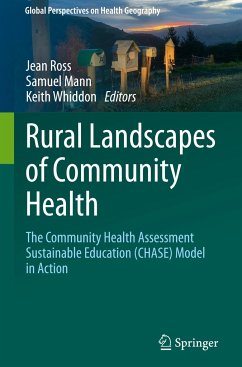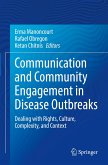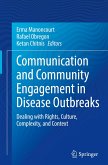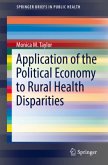The book describes a novel method of engaging rural communities in partnership initially with nurse learners to research and employ the Community Health Assessment Sustainability Education (CHASE) model. CHASE provides a consolidated structure that immerses nurse learners in community development in partnership with their group peers, community organisations and educational supervisors. The book engages with community development practitioners, community activists including rural health practitioners who provide services to rural populations, undergraduate health disciplines, postgraduate learners, educators, and researchers.
The CHASE system is described in detail and offers case studies on its application in a variety of geographical contexts. CHASE is a starting point that does not set out to impose a single understanding - it is adapted in practice to rural communities' requirements. Therefore, capturing how this model has been adapted within diverse internationalrural communities to accommodate community needs is paramount and aligned with each individual case study presented in the book. CHASE enhances collaborative relationships in the global landscape informing nursing curricula, and teaching and learning pedagogy internationally with a view to reduce health disparities.
This book is a valuable resource of pioneering work that spans disciplines and promotes collaboration among stakeholders invested in rural community health. By weaving together connections between disciplines and communities, the authors highlight the importance of spatial thinking and its impact on health and well-being. Readers are given a comprehensive exploration of the challenges of indigenous, minority, and vulnerable rural populations presented as insightful narrative, case studies.
- Kate Emond, Rural Department of Nursing and Midwifery, La Trobe University, Australia
The Editors have skillfully incorporated on interdisciplinary focus on the CHASE Model. The authors facilitate and evaluate favorable social change, enhance healthcare delivery systems and improve social determinants of health via interdisciplinary actions within community development.
- Angeline Bushy, University of Central Florida College of Nursing, USA
Hinweis: Dieser Artikel kann nur an eine deutsche Lieferadresse ausgeliefert werden.
The CHASE system is described in detail and offers case studies on its application in a variety of geographical contexts. CHASE is a starting point that does not set out to impose a single understanding - it is adapted in practice to rural communities' requirements. Therefore, capturing how this model has been adapted within diverse internationalrural communities to accommodate community needs is paramount and aligned with each individual case study presented in the book. CHASE enhances collaborative relationships in the global landscape informing nursing curricula, and teaching and learning pedagogy internationally with a view to reduce health disparities.
This book is a valuable resource of pioneering work that spans disciplines and promotes collaboration among stakeholders invested in rural community health. By weaving together connections between disciplines and communities, the authors highlight the importance of spatial thinking and its impact on health and well-being. Readers are given a comprehensive exploration of the challenges of indigenous, minority, and vulnerable rural populations presented as insightful narrative, case studies.
- Kate Emond, Rural Department of Nursing and Midwifery, La Trobe University, Australia
The Editors have skillfully incorporated on interdisciplinary focus on the CHASE Model. The authors facilitate and evaluate favorable social change, enhance healthcare delivery systems and improve social determinants of health via interdisciplinary actions within community development.
- Angeline Bushy, University of Central Florida College of Nursing, USA
Hinweis: Dieser Artikel kann nur an eine deutsche Lieferadresse ausgeliefert werden.








